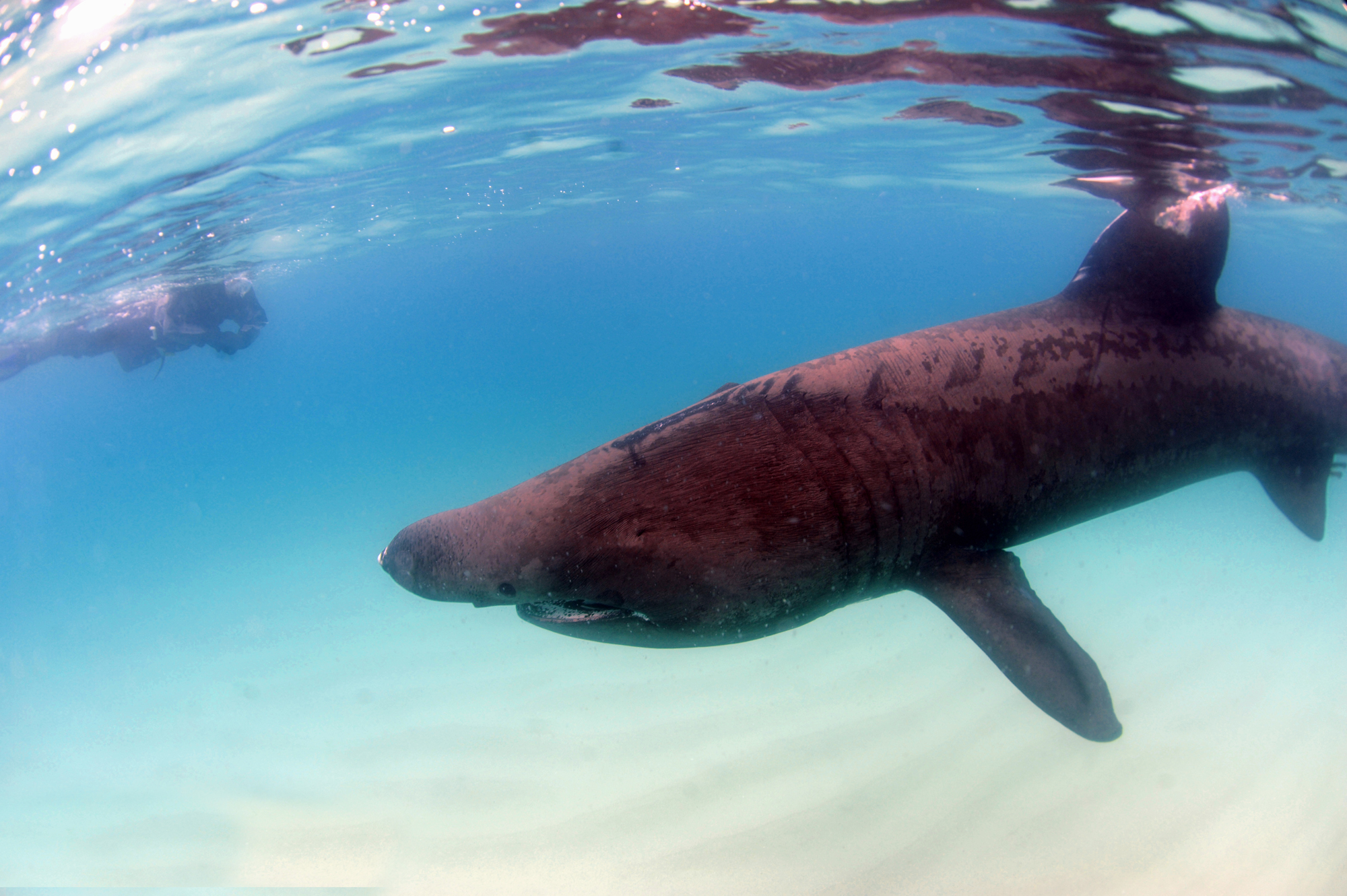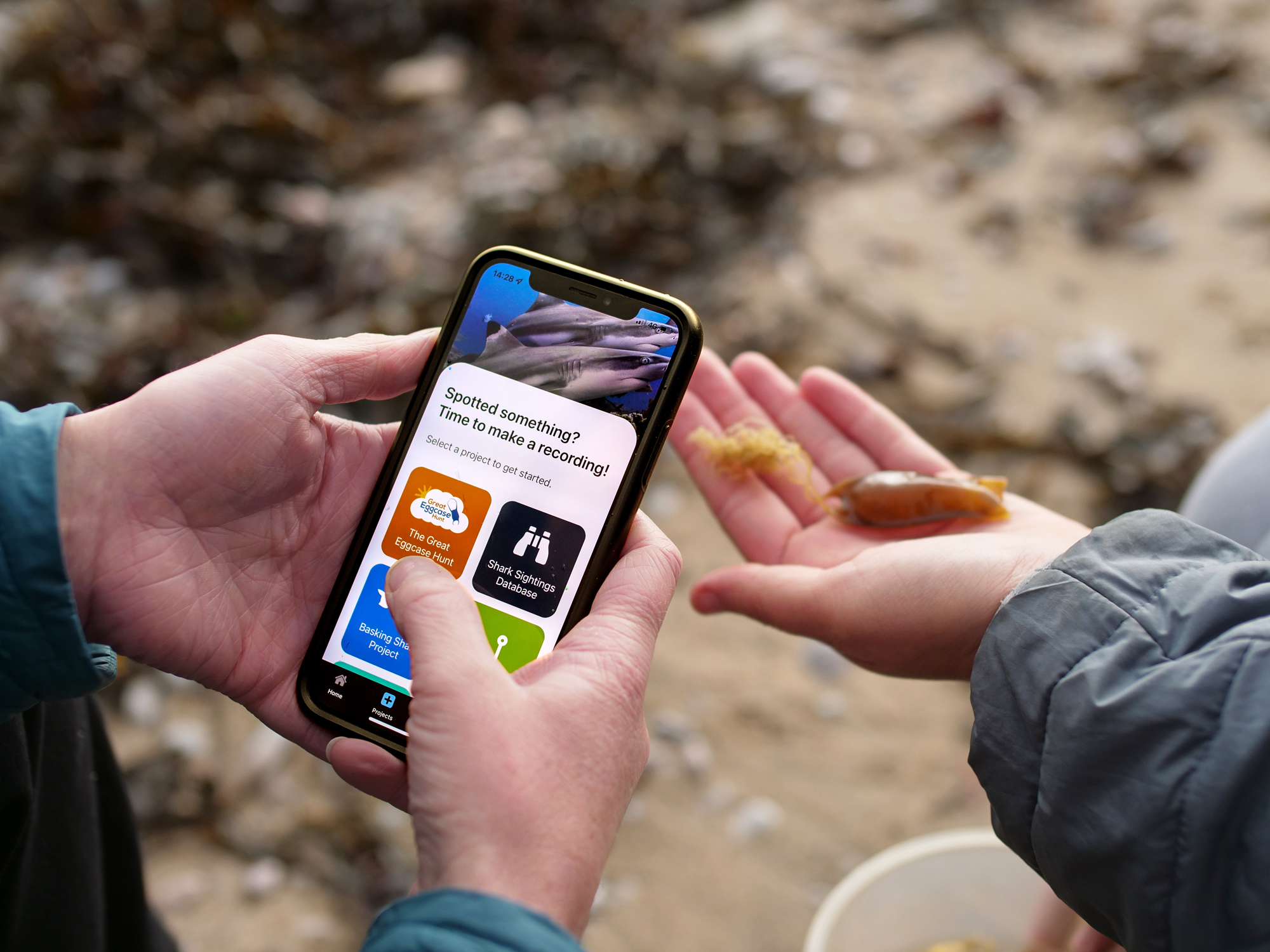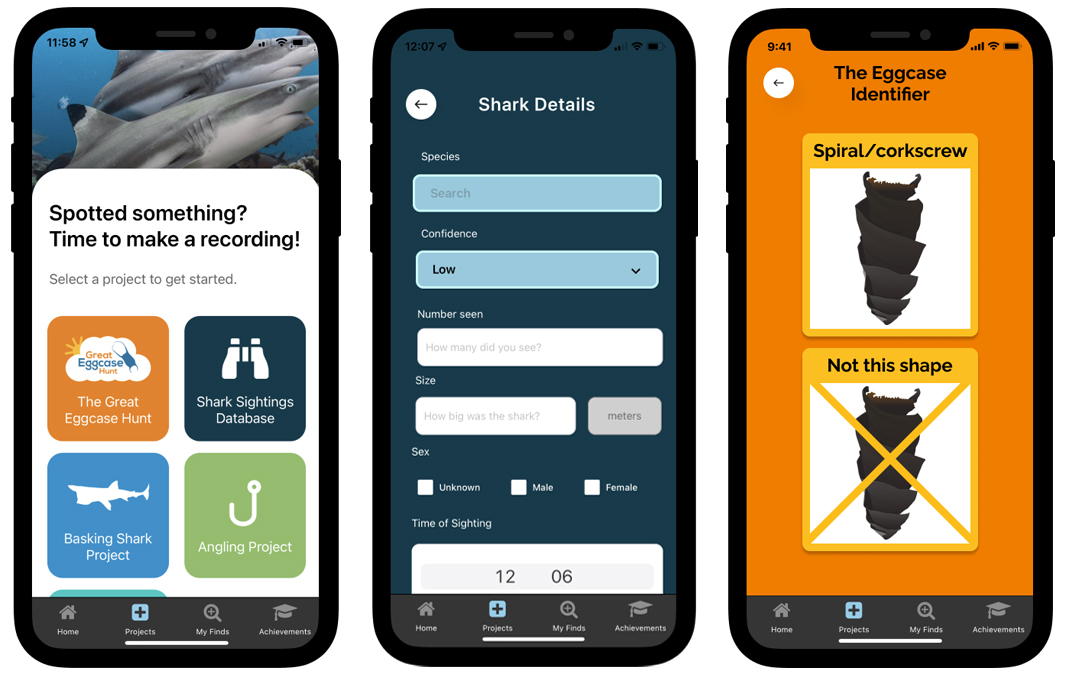Marine Life & Conservation
Shark Trust calls for global shark citizen scientists

 Never let a shark sighting go to waste!
Never let a shark sighting go to waste!
The Shark Trust has launched a new smartphone app that makes it simple for everyone to get involved in shark science and conservation. The new app brings together five citizen science projects into one place, allowing users to report: shark sightings, eggcase finds, Basking Shark observations, angling catches, and incidents of shark entanglement with marine litter.
Through these projects, anyone with an interest in sharks, skates and rays can contribute to important research and have a lot of fun along the way. The findings can be submitted from anywhere in the world and will help scientists by providing a range of vital data from some of the 1200+ species of sharks, skates and rays that swim in our ocean.
As users submit their findings across the five citizen science projects, they will build a logbook of their research contributions. These are saved in their profile and shared with the wider community, so users can see what other people have recently been discovering.
Alongside this important citizen science aspect, there are also 50 collectible shark cards to unlock: 30 bronze cards, 15 silver cards, and five gold cards. Submitting to any of the projects unlocks a card at random, so you never know what you’re going to find!
The Shark Trust’s flagship citizen science project, the Great Eggcase Hunt, which encourages the public to find the empty eggcases (or mermaid’s purses) of sharks and skate on the beach or submit those seen developing in situ, is celebrating its 20th anniversary this year.
Senior Conservation Officer Cat Gordon says “We’re really excited to be celebrating the Great Eggcase Hunt’s 20th anniversary this year! As part of the celebrations, we’re releasing this brand-new citizen science app, hosting a public evening event, and planning a special edition of the Trust’s membership magazine Shark Focus. The project has grown substantially since 2003, when we received just 128 records in the first year, to having a staggering 50,212 individual eggcases recorded in 2022 alone! In total, we’ve received over 370,000 eggcases since the project began, and we hope the app inspires even more people to get out and about in search of mermaid’s purses!”
The Great Eggcase Hunt element of the app features eggcases from species which can be found in the Northeast Atlantic, as well as those in Australia (working in partnership with the Commonwealth Scientific and Industrial Research Organisation). In time we will add identification materials from more regions, but until then, records can still be submitted from outside these areas. This app replaces the previous Great Eggcase Hunt app which was launched in 2014 – so if you previously used that then please delete it and download the new version!
If you are interested in sharks, skates and rays and want to help contribute towards research and conservation, the Shark Trust citizen science app is for you. Everyone from the occasional beachgoer to seasoned divers and anglers can get involved.
Paul Cox, Shark Trust CEO, says “For a while we’ve wanted to make it easier and more fun for people to identify and record their sightings. Thanks to a generous donation from Animal Friends Pet Insurance, we’ve been able to create this great tool with local gamification specialists, Kazow Games. We’re really excited to get this app out into the world and start to see more recorders getting involved with our projects.”
Search for ‘Shark Trust’ in the relevant app store, download the app today, and start recording your findings. We are already working on some exciting updates and are still welcoming feedback, so if you have opportunity to try it out, please let us know what you think!
Let’s build a global community of citizen scientists who can help protect these incredible animals together!
Find out more on the Shark Trust website.
Header image: James Harris
Blogs
Invitation from The Ocean Cleanup for San Francisco port call

6 years ago, The Ocean Cleanup set sail for the Great Pacific Garbage Patch with one goal: to develop the technology to be able to relegate the patch to the history books. On 6 September 2024, The Ocean Cleanup fleet returns to San Francisco bringing with it System 03 to announce the next phase of the cleanup of the Great Pacific Garbage Patch and to offer you a chance to view our cleanup system up-close and personal.
We look forward to seeing you there.
To confirm your presence, please RSVP to press@theoceancleanup.com
PROGRAM
Join The Ocean Cleanup as our two iconic ships and the extraction System 03 return to San Francisco, 6 years and over 100 extractions after we set sail, to create and validate the technology needed to rid the oceans of plastic.
Our founder and CEO, Boyan Slat, will announce the next steps for the cleanup of the Great Pacific Garbage Patch. Giving you a chance to view our cleanup system and the plastic extracted.
Hear important news on what’s next in the mission of The Ocean Cleanup as it seeks to make its mission of ridding the world’s oceans of plastic an achievable and realistic goal.
Interviews and vessel tours are available on request.
PRACTICALITIES
Date: September 6, 2024
Press conference: 12 pm (noon)
Location: The Exploratorium (Google Maps)
Pier 15 (Embarcadero at Green Street), San Francisco, CA
Parking: Visit The Exploratorium’s website for details.
RSVP: press@theoceancleanup.com
Video & photo material from several viewing spots around the bay
We look forward to seeing you there!
ABOUT THE OCEAN CLEANUP
The Ocean Cleanup is an international non-profit that develops and scales technologies to rid the world’s oceans of plastic. They aim to achieve this goal through a dual strategy: intercepting in rivers to stop the flow and cleaning up what has already accumulated in the ocean. For the latter, The Ocean Cleanup develops and deploys large-scale systems to efficiently concentrate the plastic for periodic removal. This plastic is tracked and traced to certify claims of origin when recycling it into new products. To curb the tide via rivers, The Ocean Cleanup has developed Interceptor™ Solutions to halt and extract riverine plastic before it reaches the ocean. As of June 2024, the non-profit has collected over 12 million kilograms (26.4 million pounds) of plastic from aquatic ecosystems around the world. Founded in 2013 by Boyan Slat, The Ocean Cleanup now employs a broadly multi-disciplined team of approximately 140. The foundation is headquartered in Rotterdam, the Netherlands, and opened its first regional office in Kuala Lumpur, Malaysia, in 2023.
Find out more about The Ocean Cleanup at www.theoceancleanup.com.
Marine Life & Conservation
SHARK MONTH ARRIVES AT ROYAL WILLIAM YARD, PLYMOUTH

A shark has been spotted approaching Royal William Yard in Plymouth, much to the surprise of swimmers, paddleboarders and onlookers.
With its distinctive dorsal fin cutting through the water, the sizeable shark swam along the coastline, before turning to head inland towards Firestone Arch at Royal William Yard. The appearance drew a crowd, who were captivated for more than an hour by the unusual sight – and it was all caught on video.
The shark is one of many expected sightings at Royal William Yard over the coming weeks… because today marks the start of Shark Month!
In reality, the ‘shark’ spotted along the Plymouth shoreline was actually a custom-made model, created by the team at Royal William Yard and sailed underwater by Caroline Robertson‑Brown from the Shark Trust, who donned scuba diving gear for the occasion.
The stunt took place to launch Shark Month in style and draw attention to the work of the leading international conservation charity, which is based in Britain’s Ocean City. Spectators were reassured that the water was safe and many entered into the spirit of the performance, swimming or sailing alongside the shark.
Shark Month will take place across Royal William Yard throughout July and will feature an extravaganza of art, entertainment and advocacy for everyone to enjoy. The packed programme of events starts with an art exhibition and ends with a trip on paddleboards with shark experts – with everything from a shark quiz to a Jaws screening in between.
Paul Cox, CEO of the Shark Trust, said: “There are often assumptions and misconceptions when it comes to sharks. This was certainly the case with the shark spotted at Royal William Yard! While the British coastline is home to many species of shark, this was not one of them. However, we’re thrilled it caught people’s attention, because seeing a shark is a special and memorable moment. That is precisely why we want to celebrate these incredible creatures, highlight the need for conservation, and ask for help to safeguard their future.”
For more information about Shark Month at Royal William Yard, visit the Shark Trust Website.
Images and video: Jay Stone
-

 Blogs2 months ago
Blogs2 months agoDiving With… Nico, Ocean Earth Travels, Indonesia
-

 News1 month ago
News1 month agoMurex Bangka Announce New Oceanfront Cottages & Beachfront Dining
-

 Blogs2 months ago
Blogs2 months agoA new idea in freediving from RAID
-

 Marine Life & Conservation1 month ago
Marine Life & Conservation1 month agoIceland issue millionaire whale hunter a licence to murder 128 vulnerable fin whales
-

 Marine Life & Conservation2 months ago
Marine Life & Conservation2 months agoThe Shark Trust Great Shark Snapshot is back
-

 News3 months ago
News3 months agoCharting New Waters; NovoScuba Goes Global with the Launch of their Revolutionary Dive Training Agency!
-

 Gear News1 month ago
Gear News1 month agoNew Suunto Ocean – a dive computer and GPS sports watch in one for adventures below and above the surface
-

 Marine Life & Conservation Blogs2 months ago
Marine Life & Conservation Blogs2 months agoBook Review: Plankton



















